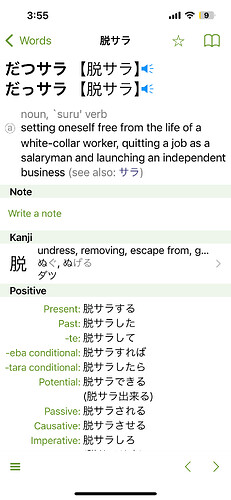They list a few possible explanations
Interesting. Definitely seems more than coincidental, especially since they’re kun’yomi. The last bullet point is especially funny
Right, of course they are. I clearly wasn’t paying attention…
鳧(けり) - grey-headed lapwing
The context I saw this in was actually the phrase 鳧がつく, which is of course ateji but led me to a revelation about that phrase that I’ve seen/read multiple times:
Along with the meaning “duck,” Jisho listed 鳧 as meaning “end, suffix.” I then realized that this phrase, along with けりをつける, literally means to put an end to something as けり is 古文 for past tense and is put at the end of a sentence. It’s even still seen today as a 切れ字 in haiku.
Been looking at akiya property listings lately. Found some with the price listed as 応相談 which my phone translates as negotiable.
正規表現 regular expression
I’m now the only gaijin at the office, so we all speak Japanese at the moment.
It turns out it’s very difficult to explain programming details in Japanese… Well, I just provided a basic overview with some english terms inserted here and there.
Learned the word for regular expressions in Japanese during a meeting. But no way I’d be able to explain all the special syntax in Japanese ![]()
Guess it’s time for this Wikipedia page then ![]()
I couldn’t help but scroll through this thread and notice あずまんが大王!
Anyway, I was intrigued by that scene and the word 「登校日」。I asked the question to a (native) Japanese friend how he would explain this word and how it’s used.
Like others have mentioned, yes, the word is commonly used in the scenario where students come back to school for a day during summer break. However, it is perfectly acceptable to use it to describe a normal school day.
Recently saw the word “ROMりましょう” in a youtube video’s description box.
ROM can mean “lurker”, apparently.
喃語 - babbling (pre-language baby sounds)
I just learned 理論 「りろん」means theory and 論理「ろんり」which means logic ![]() where I sometimes confused myself providing the correct answer during my reviews
where I sometimes confused myself providing the correct answer during my reviews ![]()
憑依: possession (by a spirit, demon, etc.)
My favorite K-pop group was on a Japanese program recently and they described them as 憑依型アイドル so I had to look that up and was not disappointed lol.
I keep forgetting what シュール means. (I hopefully remember now.)
My least favorite katakana word because I take at least a minute to come up with the meaning. It’s so annoying ![]() I have no advice
I have no advice
SCHHOOL
My most recent Japanese word is ゾンビ臭. Cracked me up when I saw the advertisement. ゾンビ臭 do be real though.
逆 (ぎゃく), meaning (according to Jisho) ‘opposite’. I saw it used in the context of ‘その逆ですか?’ regarding an object facing the wrong way, which seems to mean ‘is it the other way around?’ or ‘is it turned around?’.
Japanese in general seems (to me, anyway) to use directions and locations in both a metaphoric and literal sense - you also see it with こちら to refer to yourself, and such things. Also 方 referring to both a person and a direction, among other things.
逆 is no exception. I’ve seen it mean that someone’s of the exact opposite opinion as what’s suggested, or that someone means the exact opposite, but also to mean they're going the wrong way.
And I’m taking this as an opportunity to plug a cute song in which it has the literal “the other direction” meaning ![]()
For context, she was looking for her house on a Minecraft server, but kept getting lost. Someone decided to put it to music ![]()
つがい - a pair of mated animals
A lot of vocab use 逆, such 逆効果(opposite effect, like if you tried to do something to lose weight but turned out gaining weight as a result). Or even 逆ナン😄
逆+ナンパ(pickup) = female pickup (ie girls chatting up boys).



